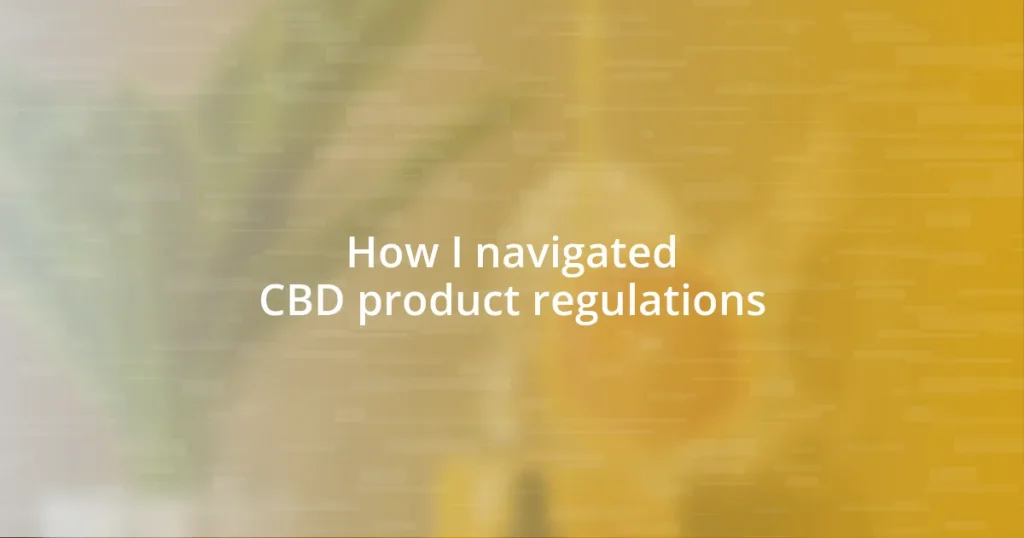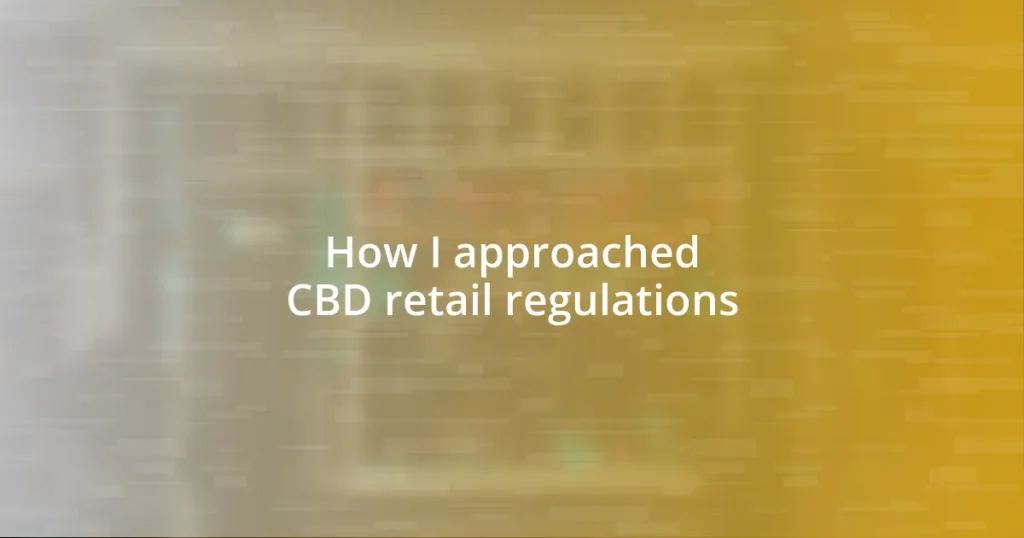Key takeaways:
- Staying informed about CBD regulations is crucial; subscribing to newsletters and engaging with industry associations can facilitate this.
- Adapting product offerings and compliance strategies can turn regulatory challenges into growth opportunities, while maintaining quality and customer trust.
- Education and transparency with customers about the implications of new laws help foster loyalty and community engagement.
- Proactive monitoring of legal developments through social media and networking enhances understanding and preparedness for future changes.
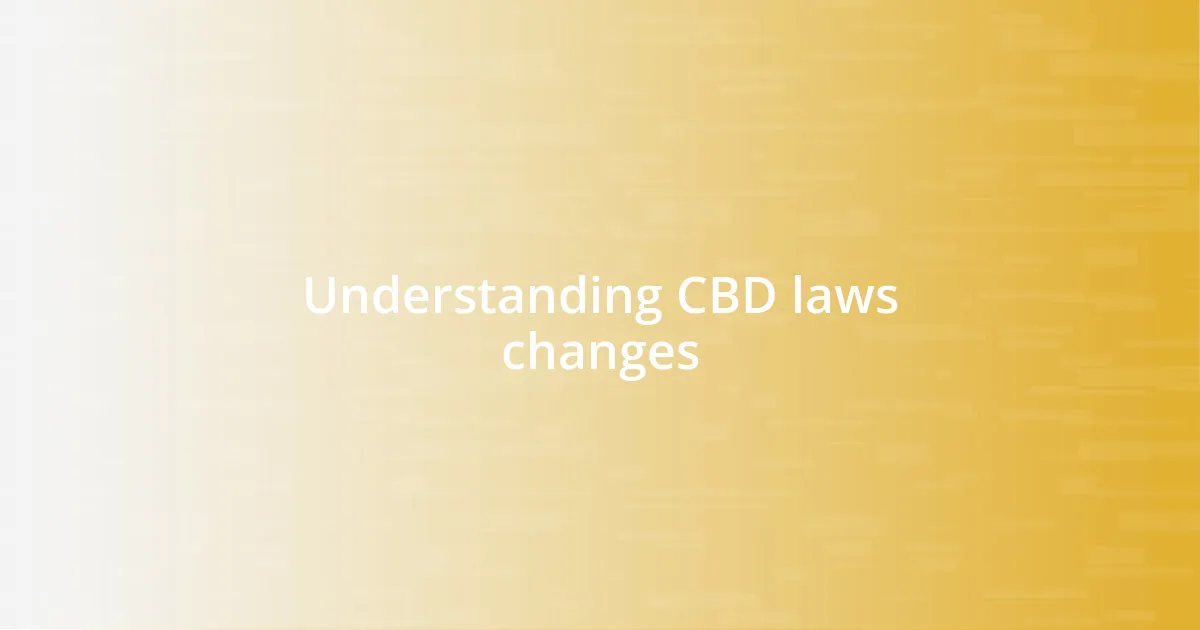
Understanding CBD laws changes
Understanding CBD laws changes can feel overwhelming, especially when I think back to the first time I tried to navigate them. I remember sitting at my kitchen table surrounded by stacks of papers, feeling both frustrated and confused as I tried to make sense of the differing regulations across states. Have you ever felt that way, lost amid the fine print and shifting rules?
As I delved deeper, I realized that CBD laws are often influenced by factors like state politics, agricultural trends, and public perception. Just last year, I found myself attending a local town hall meeting where passionate advocates clashed with skeptics over the legality of CBD-infused products. That moment emphasized to me how much grassroots support can shape regulations, yet it also left me pondering about the long-term stability of these laws.
Every change in CBD legislation can have a direct impact on consumers and businesses alike. I felt a sense of urgency when my favorite CBD store had to change its product offerings overnight due to new restrictions. It made me question: how can we, as consumers, stay informed and adaptable? My journey taught me that staying connected with industry updates and community discussions is essential, allowing us to anticipate changes before they affect us.

Identifying key regulatory updates
Identifying key regulatory updates in the CBD landscape has become an essential part of staying compliant. I recall the moment when I stumbled upon a significant amendment to the Farm Bill while scrolling through my social media feed. It was a simple notification, yet it sent me down a rabbit hole of research to unearth how the new guidelines would impact my business. The sheer relief of being proactive rather than reactive was empowering.
Here are some strategies that helped me stay informed about regulations:
- Subscribing to Industry Newsletters: I found that weekly updates provide concise summaries of the latest changes.
- Joining Local CBD Associations: Networking with other professionals has been invaluable for sharing insights and experiences.
- Following Regulatory Agencies: Keeping an eye on reports from organizations like the FDA can offer early warnings about upcoming changes.
By systematically monitoring these sources, I managed to navigate the ever-evolving landscape with much more confidence. The sense of security in knowing I’m staying updated on these changes is something I cherish.

Assessing impacts on my business
The impact of changing CBD laws on my business has been profound and multifaceted. One notable instance was when a new legal requirement mandated stricter labeling practices. I remember feeling a wave of anxiety wash over me as I realized I would need to revamp my product packaging almost overnight. It was a daunting task, but ultimately, it helped me create a more trustworthy image in the eyes of my customers. Adapting to these changes not only kept me compliant but also reinforced my commitment to quality and transparency.
Additionally, the shifting legal landscape has forced me to reevaluate my supply chain. When a state lifted restrictions on hemp sourcing, I was thrilled at first. But then, I quickly learned that this change came with new quality control expectations. The more I understood, the more proactive I became in selecting suppliers who aligned with the new standards. That experience taught me that flexibility and a willingness to adapt can turn regulatory challenges into opportunities for growth.
To further illustrate the varying impacts, I’ve created a comparison table that outlines the effects of major regulatory updates on my business:
| Regulatory Update | Impact on Business |
|---|---|
| Stricter Labeling Requirements | Revamped packaging for compliance and trust |
| New Hemp Sourcing Restrictions | Reassessed suppliers for quality assurance |

Adapting product offerings accordingly
Adapting my product offerings to align with changing CBD laws has been a journey of both creativity and strategy. I vividly recall the moment I had to phase out a line of products that contained ingredients flagged as potentially non-compliant. It was a tough decision, especially since those products were popular with my customers. But I realized that embracing change meant offering alternatives that met new regulations while keeping my brand’s integrity intact.
As I explored new formulations, I focused on enhancing the potency and purity of my offerings. I remember tweaking a popular tincture recipe, infusing it not only with compliant ingredients but also with natural flavors that delighted existing customers and attracted new ones. This experience reinforced a vital lesson: adaptability requires a blend of innovation and an unwavering commitment to quality. When regulations shift, they can often open doors to new opportunities for creativity.
In times of uncertainty, I also learned the importance of engaging with my audience. When a recent law change prompted a product withdrawal, I didn’t just update my website; I reached out to my loyal customers through newsletters and social media, explaining the reason behind the change. It was gratifying to see how transparency not only alleviated their concerns but also strengthened their loyalty to my brand. Isn’t it fascinating how change can foster deeper connections if handled with genuine care?
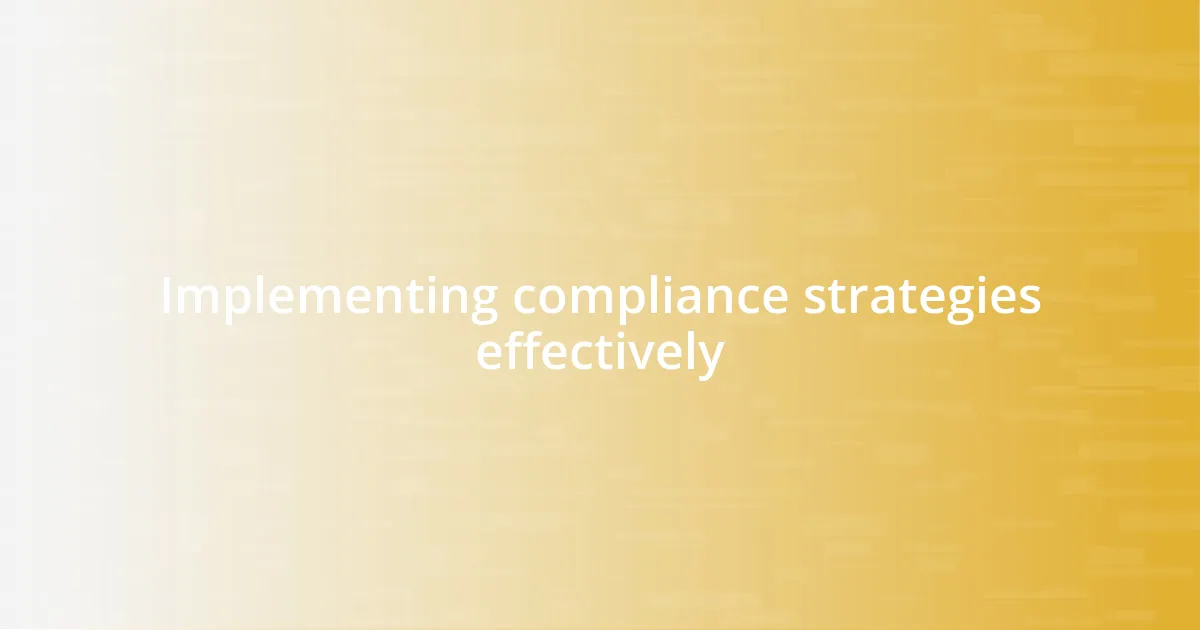
Implementing compliance strategies effectively
Implementing effective compliance strategies can feel like walking a tightrope, especially in such a dynamic industry. I remember the first time I attended a compliance workshop—my notepad was filled with regulations and best practices, but it was overwhelming. However, I realized that not only understanding the laws but also investing time in training my team was essential. I recall organizing monthly training sessions, where we discussed compliance updates and brainstormed how to apply them effectively. This collaborative approach not only improved our compliance rates but also fostered a culture of accountability among my staff.
One strategy that proved effective for me was creating a compliance checklist tailored to my specific business needs. It was like having a roadmap in an unfamiliar territory. Each time a new regulation emerged, I would revisit that checklist, modifying it to ensure we remained aligned with the latest laws. This structured approach gave me peace of mind and allowed me to focus on other areas of my business. Have you ever experienced that feeling of relief when everything just clicks into place? That’s what it felt like when I saw my team confidently navigating compliance issues with this tool at their disposal.
Another crucial component of my strategy was maintaining open lines of communication with regulatory agencies. I remember reaching out to a local compliance officer with questions about a particularly tricky regulation. Their guidance not only helped clarify my doubts but also built a rapport that proved beneficial down the line. Knowing I could consult with them eased my stress and allowed me to focus on implementing changes rather than worrying about potential violations. This experience taught me that proactive engagement is vital; isn’t it reassuring to know that there’s a support system out there, ready to help?

Educating customers on new laws
Educating customers about new CBD laws became a pivotal part of my strategy as regulations changed. I remember hosting an informal Q&A session in my store, where I shared insights about the new laws and what they meant for our products. Watching customers nodding in understanding and asking questions reminded me how impactful face-to-face communication can be. Have you ever noticed how much clearer things become when you dive into discussions together?
I also created a dedicated section on my website to keep customers informed. It was enlightening to see what topics sparked the most interest—a lot of them wanted practical examples of how the laws affected their favorite products. I found myself writing blog posts that broke down legal jargon into relatable terms. It made me feel like a bridge between complex regulations and my customers’ daily lives. The feedback was heartening; customers appreciated being well-informed, and it sparked conversations that deepened their connection to my brand.
In my experience, leveraging social media to share updates was another game-changer. I vividly recall posting a video that explained a recent law change, paired with visuals of our compliant products. The comments flooded in, with customers sharing their thoughts and experiences. It struck me how vital it is to make this information engaging. When we can create a dialogue, it transforms what could be a mundane topic into a community discussion. Doesn’t it feel rewarding when knowledge empowers both you and your customers?
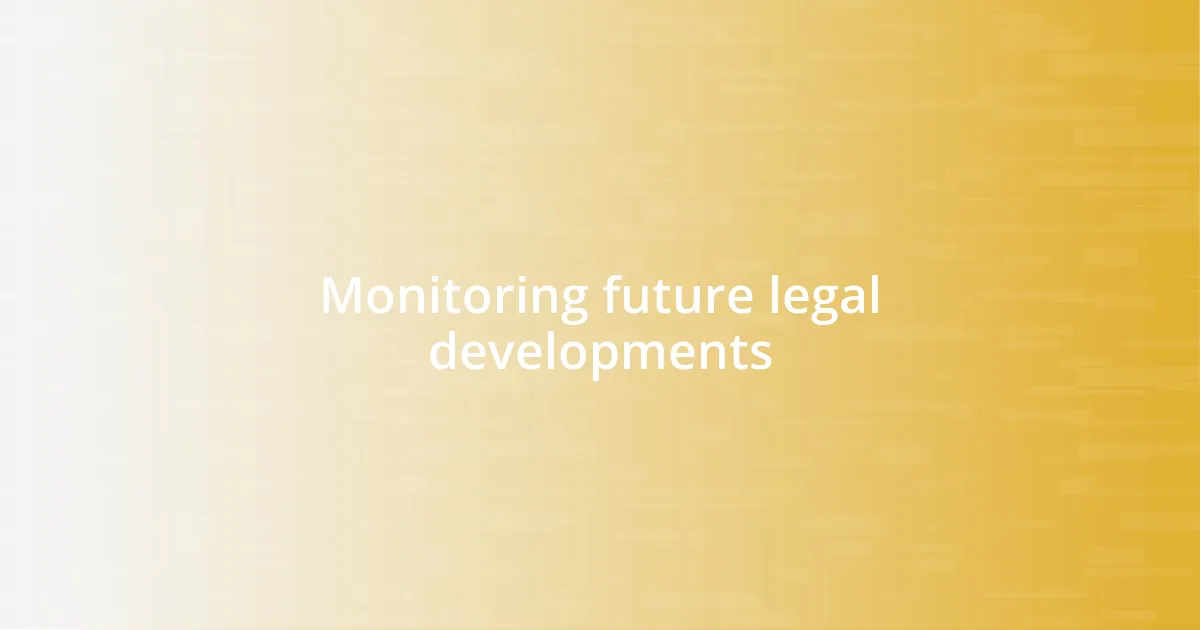
Monitoring future legal developments
Monitoring future legal developments has become an ongoing journey for me. I remember the first time I subscribed to a CBD law newsletter; it felt like I unlocked access to a treasure trove of information. Each morning, I would sift through updates, highlighting changes that could impact my business. It transformed my approach from reactive to proactive. Have you experienced that sense of empowerment that comes from staying informed?
I’ve also learned to leverage social media platforms where legal experts and industry insiders share their insights. Just last month, I joined a Twitter chat focused on emerging regulations in the cannabis industry. Engaging in real-time conversations with knowledgeable people made me feel part of a community that was equally invested in compliance. Isn’t it fascinating how these modern tools can connect us to essential information and like-minded individuals?
To further enhance my monitoring efforts, I created a network of contacts within the industry. Attending trade shows sparked countless discussions with fellow entrepreneurs about their interpretation of new laws. I recall a particularly enlightening conversation with a colleague who shared their experience navigating a recent legal change that I was grappling with. These discussions provided clarity and reassurance, reinforcing the importance of collaboration in an ever-evolving landscape. Do you find that sharing experiences with others not only solidifies your understanding but also broadens your perspective?











